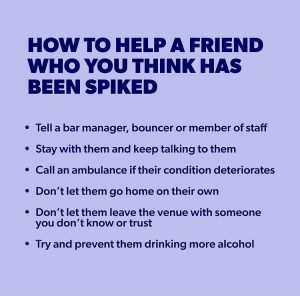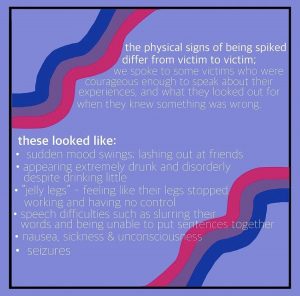What’s happening?
Popular Instagram account @edi_anonymous revealed “multiple reports of spiking by injection in Edinburgh clubs” last week, with The Times reporting that “those claiming to be affected say they have woken up with a small red bump on their back and have reported symptoms similar to being spiked with a pill, including suddenly feeling drunk, drowsy or sick”.
Spiking via injection is a relatively novel phenomenon, and carries added risks on top of the typical dangerous physical and mental threats posed by oral spiking.
“This form of spiking brings unique dangers compared to drink spiking. When drugs are injected they reach the nervous system quicker than when swallowed, so the effects kick in faster too. […] Additionally, the needle could break during the injection or transmit infectious diseases.”
Ivan Ezquerra Romano, Co-Founder and Director of Drugs and Me
To compound these concerns, The Guardian on Monday reported that there is a critical shortage of bouncers in UK clubs due to the latest staffing squeeze, with chief executive of the Night Time Industries Association Michael Kill warning of a “very real chance it could become a threat to public safety”.
While it is difficult to record any real increase in occurrences due to the limitations of statistics on the matter, more public discussions (especially via social media) have been happening about the crippling effects of spiking on its victims.
Starting as an Edinburgh-specific initiative, ‘Girls Night In’ is an “organised boycott of […] nightclubs until the spiking outbreak is taken more seriously”, encouraging all supporters to have a night in and avoid visiting any clubs on specific dates throughout October.
The Edinburgh boycott has amassed over 5,155 followers (at the time of this article’s writing) in just three days, and over 50 Instagram accounts building support for the boycott from various regions and universities around the UK have been created.
The Edinburgh Instagram account @girlsnightinedinburgh released a list of key demands and concerns for nightclubs in the area, including further training for staff in collaboration with organisations like Crew 2000, wide-reaching CCTV, clear cups and lids, lifelong bans for anyone caught spiking, and more thorough security measures including bag checks.
https://www.instagram.com/p/CVPifdmoR4w/
Charli Smith, first-year student at Swansea University told Volteface that she simply wants bouncers “to care more about spiking than kicking boys out for doing coke or fighting”.
On-campus groups, including the Students for Sensible Drug Policy KCL, have pushed bars associated with the university to take the matter more seriously. Popular bar for KCL students Dover Castle Bar has since committed to upgrading CCTV system, conducting random searches, and providing StopTopp drink lids for patrons.
A petition to parliament calling for “a legal requirement for nightclubs to thoroughly search guests on entry” has attracted over 132,000 signatures at the time of writing, and the matter will thus be considered for debate by Parliament.
What is spiking and how often does it happen?
With the emergence of spiking via injection, we should start to consider spiking any practice that non-consensually adds or inserts a drug into another person, typically through their drink while they are not looking.
While statistics obtained in 2019 revealed an all-time high in cases of drink spiking, reporting over 2,600 incidents between 2015 and 2019, these figures grossly underestimate the actual gravity of the issue. In the vast majority of cases, victims do not report the incident to authorities due to shame, stigma, difficulties in pursuing prosecution and limited evidence available.
A BBC report found that victims of spiking are overwhelmingly women, comprising 71.6% of all cases.
The most common drugs used in spiking are alcohol, GHB, ketamine, and benzodiazepines like valium or rohypnol. As many drugs used in spiking are central nervous system depressants, if used in conjunction with alcohol the effects of both are amplified and can be life-threatening.
Most incidents of spiking take effect within 15-30 mins, and may last for several hours following consumption. There is unlikely to be a noticeable change in taste or colour of a drink.
Spiking is often done with the intention of committing sexual assault or an act of theft, but most commonly may be considered a ‘harmless’ prank between friends. Thus, it occurs at house parties more commonly than at nightclubs.
Counselling service Crew 2000 outlined on a widely-shared Instagram post the key examples of spiking, including “putting double measures in someone’s drink when they only asked for a single”, “topping up someone’s glass when they don’t notice”, “buying someone a drink when they are already drunk”, “giving someone a line and telling them it’s cocaine when it is actually ketamine”, or “giving someone less experienced with drugs or someone who is smaller in body size or frame the same dose as you”.
https://www.instagram.com/p/CVDnpfAtV8d/
What are the dangers of spiking?
There are immediate physiological risks to the victim of spiking, where overdoses, toxic combinations, cardiac arrests, seizures and comas are all possible and indeed recorded outcomes. The use of drink spiking to commit an act of sexual assault also carries unique physical harms to the victim.
The long-term psychological effects of spiking can also be crippling, even independent of any immediate physical harm. Being the victim of drink spiking can be traumatising, cause memory blackouts, and post-traumatic stress.
“It didn’t fully hit me until the day after what had actually happened. It rattled me for a few weeks; I didn’t want to go out again.”
Anonymous victim of drink spiking.
“I was spiked a couple years ago after accepting a drink of water from someone on the dance floor. It was extremely scary, and I’m so lucky that my friend was able to quickly put two and two together to figure out I had been spiked, and needed medical attention. However, my friend also told me that the medical team at the club didn’t believe that I had been spiked, and assumed I had willingly taken drugs, and was experiencing adverse effects from that. […] Thankfully I made a full recovery (with a near hospital trip), and since I’ve been super vigilant, to the extent of suspicion, when I go on a night out. It has definitely changed the nature of my nights out”
Another anonymous victim of spiking.
Who can prevent spiking?
While there are some considerations club and party-goers can make to reduce the possibility of spiking, including not accepting drinks from strangers, watching your drink getting poured, never leaving the drink unattended, and making use of drink covers, the emergence of spiking by injection proves aptly that the the ultimate onus for preventing spiking lay with the perpetrator.
https://www.instagram.com/p/CVGPBLbtxVQ/
Attracting hundreds of quote tweets and comments from students and advocates alike, Durham University Student Wellbeing services recently posted on Twitter a now-deleted call to action, telling students” #dontgetspiked”.
“Drink Spiking is dangerous and something that you can prevent from happening to you and your friends. #dontgetspiked Contact the police as soon as possible in a suspected case so an investigation can be conducted and others protected”.
Original copy of Durham University Student Wellbeing post.
This messaging that centres the victim in their responsibility to prevent their own assault repeats the destructive rhetoric of victim-blaming, akin to police commissioner Philip Allot’s comments that, after Sarah Everard’s tragic death and ensuing concern over women’s safety in the UK, women “need to be streetwise” and “just learn a bit about that legal process” if approached by police officers.
A member of Durham Students’ Union replied to the university’s tweet, calling the post “disappointing” and the hashtag “widely inappropriate”. “All guilt lies with perpetrators – the primary focus must be on them”.
The university released the following statement in response to criticism:
“We appreciate the feedback on our recent post about drink safety. Students have reported concerns to us about drink spiking on nights out. We take this very seriously, and work with the police and others on guidance to help people be safe and report incidents.
We also regularly train staff and student representatives on drug and alcohol awareness. We always aim to support our students and take opportunities to learn and improve our messaging on important topics like this.”
How do we end spiking?
In the wake of the tragic death of Sarah Everard and calls from people across the UK for a stronger focus on women’s safety by the government, police, venues, and public transport, dealing with spiking is absolutely crucial.
At every level, there are improvements to be made.
- The government must fund training for and incentivise more bouncers to resolve the critical shortage across the UK.
- Bar and club management must improve security, ensure all staff are trained in first-aid, signs of spiking both from victims and perpetrators, and consider expanding CCTV in areas that serve alcohol. They must also consider making lids or spiking tests available through the bar.
- Student wellbeing services at universities must clarify their positions on the matter, committing to an anti-spiking policy that places the responsibility of the crime on perpetrators and not victims. They must also improve their ability to counsel victims after the crime has taken place, ensuring staff are well-trained on the severity of the crime.
While spiking via injection is broadly considered a deeply insidious and premeditated attack, not all spiking is perceived as maliciously. Therefore the friends of those who may be spiking individuals, and all clubgoers play a particularly significant role in reducing the problem.
Friends should look after each other on nights out (or nights in), ensuring no drink is left unattended, that our friends’ levels of intoxication are proportionate to the amount of alcohol we have seen them consuming, and that we know the signs of spiking.

Graphic from @studentbeans

Graphic from @reclaimthesestreetsaberdeen
We must all also have tough conversations with our friends if we suspect that they have spiked someone, no matter how ill we perceive their intentions.
There are myriad ways to reduce, or end the alleged “epidemic” of spiking sweeping the UK. It is simply disappointing that it has taken the voices of thousands of victims still dealing with the legacy of their assault to make these key bodies listen.
For more information on drink spiking, see https://www.drinkaware.co.uk/advice/staying-safe-while-drinking/drink-spiking-and-date-rape-drugs.
This piece was written by Content Officer Isabella Ross, tweets @isabellakross.
Lead image credit: CC 2.0 https://www.flickr.com/photos/johnjoh/6309482463/in/album-72157627921147759/
